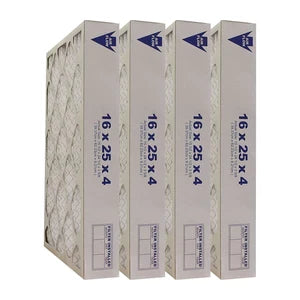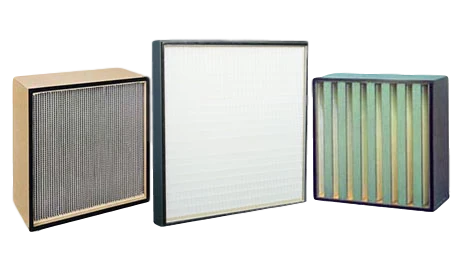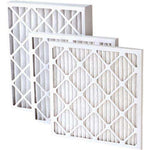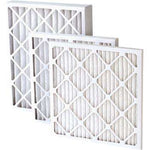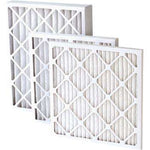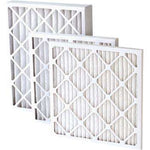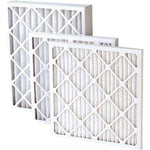Vous avez pas d'articles dans votre panier.
Maintaining good indoor air quality is vital for your health and well-being, especially if you spend a significant amount of time indoors. Pollutants like dust, pollen, mold spores, pet dander, and even airborne chemicals can accumulate in indoor environments, contributing to respiratory problems, allergies, and general discomfort. One of the most effective ways to tackle these issues is through air filters. But how do air filters actually improve indoor air quality? Let's explore their role and impact in more detail.
1. Removing Particulate Matter
The primary function of an air filter is to remove particulate matter from the air. Particulate matter refers to tiny solid or liquid particles that float around in the air, such as dust, pollen, and mold spores. These particles can cause a variety of health problems, especially for people with allergies or respiratory conditions. By filtering out these contaminants, air filters help maintain a cleaner and healthier indoor environment.
High-efficiency particulate air (HEPA) filters are particularly effective at removing these particles. A true HEPA filter can capture up to 99.97% of particles as small as 0.3 microns, including dust mites and pet dander. This means that the air passing through a HEPA filter is significantly cleaner, helping to reduce the presence of allergens and other harmful substances that can trigger health issues.
2. Reducing Allergens and Asthma Triggers
Allergens like pollen, mold, and pet dander can be a constant source of discomfort for people with allergies or asthma. Air filters are particularly beneficial in reducing these allergens. By capturing these tiny particles before they can circulate throughout your home, air filters help create an environment where it is easier to breathe and experience fewer symptoms.
The reduction of these allergens is especially important for those who have asthma. Airborne irritants can provoke asthma attacks and cause breathing problems. By using an efficient air filter, asthma sufferers are less likely to experience symptoms caused by common indoor air pollutants. This, in turn, can lead to better overall quality of life and fewer health-related disruptions.
3. Eliminating Odors and Volatile Organic Compounds (VOCs)
Air filters, especially those with activated carbon, can also help eliminate odors and volatile organic compounds (VOCs) from the air. VOCs are chemicals released from products such as cleaning agents, paint, and furniture. Prolonged exposure to VOCs can have adverse health effects, such as headaches, dizziness, and even long-term respiratory problems.
Activated carbon filters work by adsorbing these chemicals and odors, thereby reducing their concentration in the air. This is particularly useful for people who are sensitive to chemical smells or for households that frequently use cleaning products. With an activated carbon filter, your indoor air can feel fresher, more pleasant, and safer to breathe.
4. Capturing Pet Hair and Dander
For pet owners, air filters are crucial in capturing pet hair and dander that can accumulate in the air. Pet dander is made up of tiny skin flakes, which are a major source of allergens for many people. Pet hair, though larger in size compared to other airborne particles, can also contribute to poor indoor air quality.
Air filters trap both pet hair and dander, reducing their presence in your home and helping to prevent allergic reactions. This is particularly important if you have guests who may be allergic to pets, as it ensures your indoor environment is more comfortable for everyone.
5. Improving Respiratory Health
Airborne pollutants such as smoke, dust, and mold spores can cause irritation to the respiratory system, especially for people who already have pre-existing health conditions. Air filters help improve respiratory health by reducing the number of harmful particles that reach the lungs.
Consistently breathing in clean air can help prevent the development of chronic respiratory conditions and even improve lung function over time. This is especially beneficial for children, elderly individuals, and those with weakened immune systems, as they are more vulnerable to the effects of poor air quality.
6. Enhancing HVAC System Efficiency
Air filters also improve the efficiency of your heating, ventilation, and air conditioning (HVAC) system. By capturing dust and other particles before they can settle inside the system, air filters help prevent clogging and reduce wear and tear on HVAC components. This not only extends the lifespan of your system but also keeps your home more energy-efficient.
A clean HVAC system requires less energy to heat or cool your home, leading to reduced energy bills. Moreover, an efficient system helps maintain a consistent airflow, which contributes to better indoor air quality and comfort.
7. Filtering Smoke and Airborne Bacteria
Another important benefit of air filters is their ability to filter smoke and airborne bacteria. Smoke from cooking, wildfires, or tobacco can linger in the air, posing health risks and reducing indoor comfort. HEPA filters are highly effective at removing smoke particles, helping to maintain a cleaner and safer indoor environment.
Airborne bacteria, although smaller than other types of pollutants, can also be captured by high-quality air filters. Reducing the presence of bacteria in the air can help decrease the risk of airborne illnesses, making air filters an essential component of a healthy indoor environment.
Conclusion
Air filters are a simple yet powerful tool for improving indoor air quality. From reducing allergens and VOCs to capturing smoke, pet hair, and harmful bacteria, they play a critical role in maintaining a healthy and comfortable living environment. Investing in a high-quality air filter is not only beneficial for people with allergies, asthma, or other respiratory issues but also helps protect everyone in the household from the harmful effects of poor indoor air quality.
Whether you are a pet owner, someone with allergies, or simply want to breathe cleaner air, installing an air filter can make a significant difference. With various types of air filters available, including HEPA and activated carbon options, you can choose the one that best fits your needs and enhances your indoor air quality.
Frequently Asked Questions
-
What types of air filters are best for improving indoor air quality? HEPA filters are among the best for improving indoor air quality as they can capture up to 99.97% of airborne particles, including dust, pollen, and pet dander. Activated carbon filters are also great for removing odors and VOCs.
-
How often should I change my air filter? It's generally recommended to change air filters every 3 months. However, if you have pets or allergies, you may need to replace them more frequently.
-
Can air filters help with pet allergies? Yes, air filters can significantly reduce pet dander and hair in the air, which helps alleviate symptoms for those with pet allergies.
-
Do air filters remove odors? Yes, air filters with activated carbon are effective at removing odors from pets, cooking, and other household sources, making the air fresher.
-
How do air filters contribute to HVAC system efficiency? Air filters prevent dust and debris from accumulating in the HVAC system, allowing it to run more efficiently and extend its lifespan, while also ensuring better air quality.
Maintaining good indoor air quality is vital for your health and well-being, especially if you spend a significant amount of time indoors. Pollutants like dust, pollen, mold spores, pet dander, and even airborne chemicals can accumulate in indoor environments, contributing to respiratory problems, allergies, and general discomfort. One of the most effective ways to tackle these issues is through air filters. But how do air filters actually improve indoor air quality? Let's explore their role and impact in more detail.
1. Removing Particulate Matter
The primary function of an air filter is to remove particulate matter from the air. Particulate matter refers to tiny solid or liquid particles that float around in the air, such as dust, pollen, and mold spores. These particles can cause a variety of health problems, especially for people with allergies or respiratory conditions. By filtering out these contaminants, air filters help maintain a cleaner and healthier indoor environment.
High-efficiency particulate air (HEPA) filters are particularly effective at removing these particles. A true HEPA filter can capture up to 99.97% of particles as small as 0.3 microns, including dust mites and pet dander. This means that the air passing through a HEPA filter is significantly cleaner, helping to reduce the presence of allergens and other harmful substances that can trigger health issues.
2. Reducing Allergens and Asthma Triggers
Allergens like pollen, mold, and pet dander can be a constant source of discomfort for people with allergies or asthma. Air filters are particularly beneficial in reducing these allergens. By capturing these tiny particles before they can circulate throughout your home, air filters help create an environment where it is easier to breathe and experience fewer symptoms.
The reduction of these allergens is especially important for those who have asthma. Airborne irritants can provoke asthma attacks and cause breathing problems. By using an efficient air filter, asthma sufferers are less likely to experience symptoms caused by common indoor air pollutants. This, in turn, can lead to better overall quality of life and fewer health-related disruptions.
3. Eliminating Odors and Volatile Organic Compounds (VOCs)
Air filters, especially those with activated carbon, can also help eliminate odors and volatile organic compounds (VOCs) from the air. VOCs are chemicals released from products such as cleaning agents, paint, and furniture. Prolonged exposure to VOCs can have adverse health effects, such as headaches, dizziness, and even long-term respiratory problems.
Activated carbon filters work by adsorbing these chemicals and odors, thereby reducing their concentration in the air. This is particularly useful for people who are sensitive to chemical smells or for households that frequently use cleaning products. With an activated carbon filter, your indoor air can feel fresher, more pleasant, and safer to breathe.
4. Capturing Pet Hair and Dander
For pet owners, air filters are crucial in capturing pet hair and dander that can accumulate in the air. Pet dander is made up of tiny skin flakes, which are a major source of allergens for many people. Pet hair, though larger in size compared to other airborne particles, can also contribute to poor indoor air quality.
Air filters trap both pet hair and dander, reducing their presence in your home and helping to prevent allergic reactions. This is particularly important if you have guests who may be allergic to pets, as it ensures your indoor environment is more comfortable for everyone.
5. Improving Respiratory Health
Airborne pollutants such as smoke, dust, and mold spores can cause irritation to the respiratory system, especially for people who already have pre-existing health conditions. Air filters help improve respiratory health by reducing the number of harmful particles that reach the lungs.
Consistently breathing in clean air can help prevent the development of chronic respiratory conditions and even improve lung function over time. This is especially beneficial for children, elderly individuals, and those with weakened immune systems, as they are more vulnerable to the effects of poor air quality.
6. Enhancing HVAC System Efficiency
Air filters also improve the efficiency of your heating, ventilation, and air conditioning (HVAC) system. By capturing dust and other particles before they can settle inside the system, air filters help prevent clogging and reduce wear and tear on HVAC components. This not only extends the lifespan of your system but also keeps your home more energy-efficient.
A clean HVAC system requires less energy to heat or cool your home, leading to reduced energy bills. Moreover, an efficient system helps maintain a consistent airflow, which contributes to better indoor air quality and comfort.
7. Filtering Smoke and Airborne Bacteria
Another important benefit of air filters is their ability to filter smoke and airborne bacteria. Smoke from cooking, wildfires, or tobacco can linger in the air, posing health risks and reducing indoor comfort. HEPA filters are highly effective at removing smoke particles, helping to maintain a cleaner and safer indoor environment.
Airborne bacteria, although smaller than other types of pollutants, can also be captured by high-quality air filters. Reducing the presence of bacteria in the air can help decrease the risk of airborne illnesses, making air filters an essential component of a healthy indoor environment.
Conclusion
Air filters are a simple yet powerful tool for improving indoor air quality. From reducing allergens and VOCs to capturing smoke, pet hair, and harmful bacteria, they play a critical role in maintaining a healthy and comfortable living environment. Investing in a high-quality air filter is not only beneficial for people with allergies, asthma, or other respiratory issues but also helps protect everyone in the household from the harmful effects of poor indoor air quality.
Whether you are a pet owner, someone with allergies, or simply want to breathe cleaner air, installing an air filter can make a significant difference. With various types of air filters available, including HEPA and activated carbon options, you can choose the one that best fits your needs and enhances your indoor air quality.
Frequently Asked Questions
-
What types of air filters are best for improving indoor air quality? HEPA filters are among the best for improving indoor air quality as they can capture up to 99.97% of airborne particles, including dust, pollen, and pet dander. Activated carbon filters are also great for removing odors and VOCs.
-
How often should I change my air filter? It's generally recommended to change air filters every 3 months. However, if you have pets or allergies, you may need to replace them more frequently.
-
Can air filters help with pet allergies? Yes, air filters can significantly reduce pet dander and hair in the air, which helps alleviate symptoms for those with pet allergies.
-
Do air filters remove odors? Yes, air filters with activated carbon are effective at removing odors from pets, cooking, and other household sources, making the air fresher.
-
How do air filters contribute to HVAC system efficiency? Air filters prevent dust and debris from accumulating in the HVAC system, allowing it to run more efficiently and extend its lifespan, while also ensuring better air quality.
